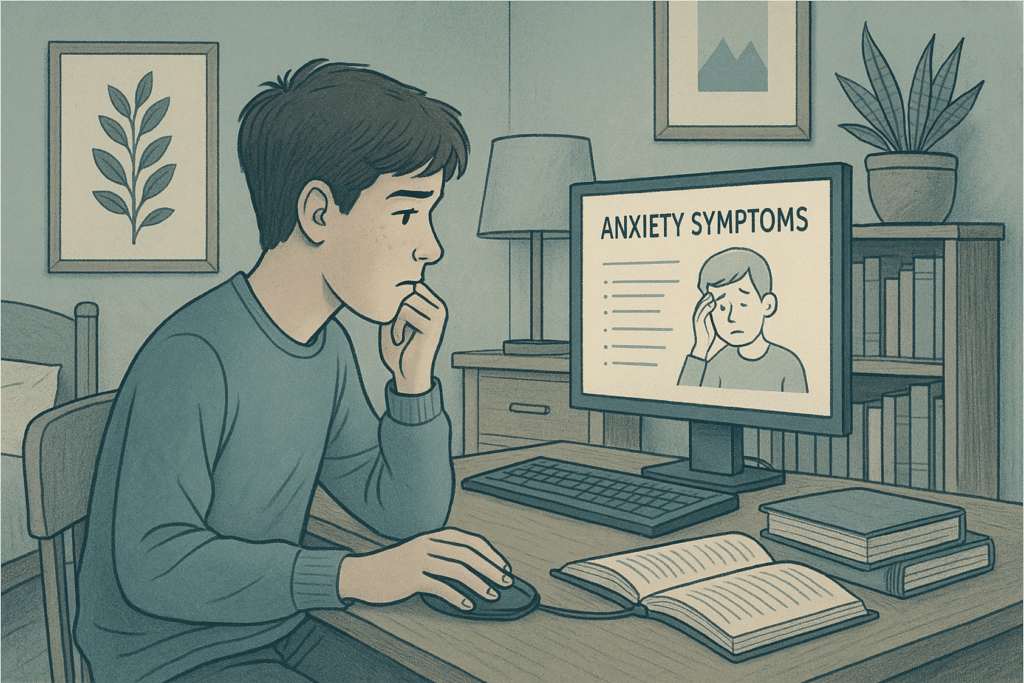Key Takeaways
- Teen boys often exhibit anxiety through physical, emotional, and behavioral symptoms.
- Common physical signs include rapid heartbeat, headaches, and muscle tension.
- Emotional symptoms can manifest as excessive worrying and irritability.
- Behavioral symptoms often involve avoidance and restlessness.
- Mission Prep’s biopsychosocial treatment model addresses the unique presentation of anxiety in teen boys through personalized therapy plans that integrate CBT, DBT, and somatic experiencing techniques.
Anxiety in Teen Boys
Anxiety is not just an adult issue—it’s a significant concern for teenagers, too. The world can feel overwhelming, and teen boys face numerous challenges as they grow. From academic pressures to social dynamics, they can feel a lot of anxiety.
Recognizing Symptoms Early
Spotting anxiety symptoms early can make all the difference. Teen boys may not always express their feelings openly, which makes it essential to pay attention to subtle cues. By recognizing these signs, we can intervene early and provide the necessary support and resources to manage anxiety effectively.
Mission Prep Healthcare specializes in mental health treatment for teens aged 12-17, offering residential and outpatient programs for anxiety, depression, trauma, and mood disorders. Our therapies include CBT, DBT, EMDR, and TMS, tailored to each adolescent’s needs.
With a structured, supportive environment, we integrate academic support and family involvement to promote lasting recovery. Our goal is to help teens build resilience and regain confidence in their future.
Physical Symptoms
Physical symptoms of anxiety are often the most noticeable. They can be mistaken for other health issues, so it’s crucial to understand what these symptoms might look like.
Rapid Heartbeat
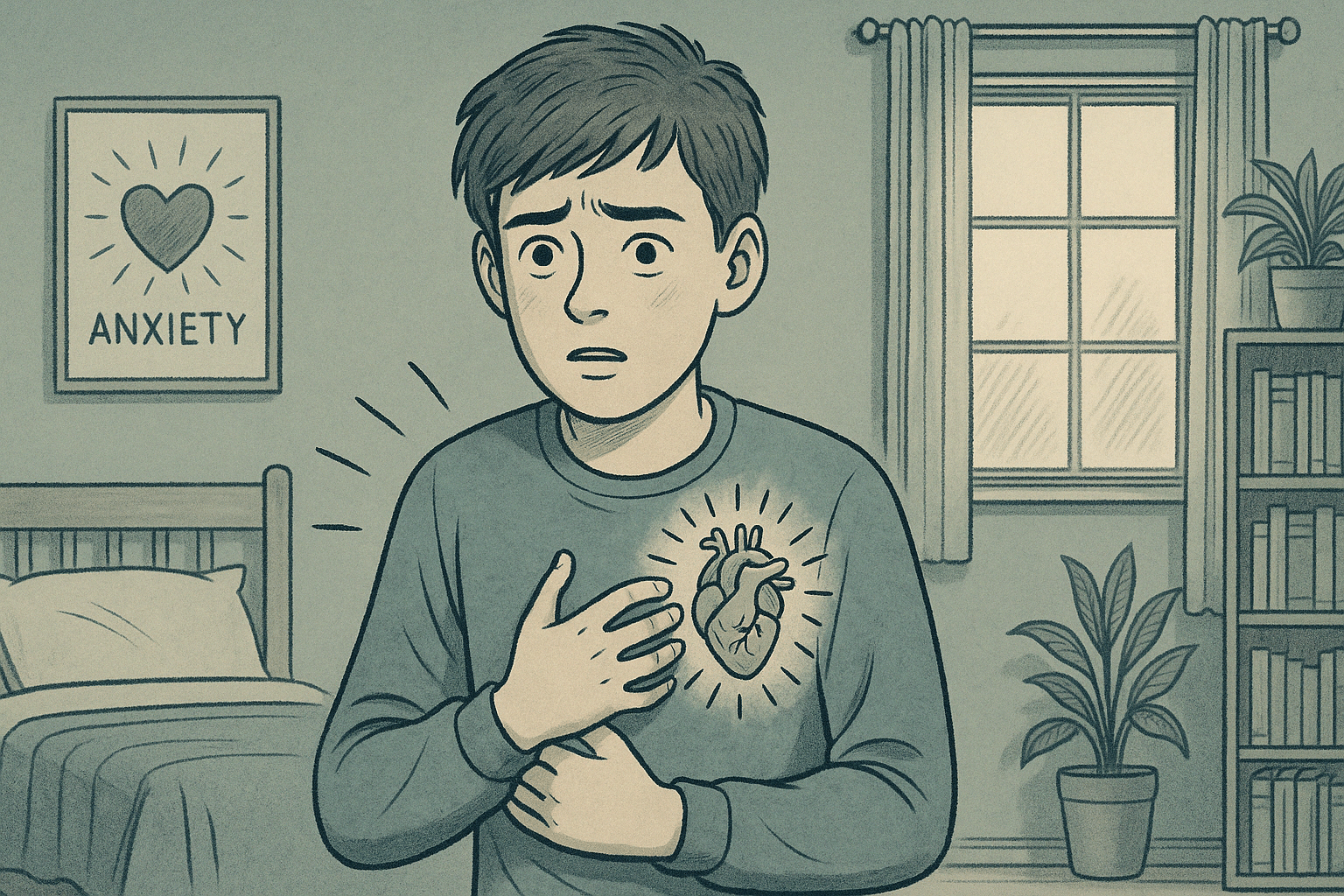
A rapid heartbeat is a common physical symptom of anxiety.
You might experience your heart racing even when you’re not exerting yourself physically. This can be alarming and uncomfortable, making it an essential symptom to recognize and address.
Imagine feeling your heart pounding in your chest while sitting in class. It’s distracting and can make focusing on anything else challenging. If you frequently experience this, anxiety may be a potential cause.
Frequent Headaches
Headaches are another common symptom. Stress and anxiety can lead to tension headaches that can be debilitating. You may complain of persistent headaches that seem to have no apparent cause. Addressing the underlying anxiety can often alleviate these physical symptoms.
Muscle Tension
Muscle tension is often overlooked but is a significant physical symptom of anxiety. You might feel your muscles are constantly tight or sore without any physical exertion. This tension can lead to discomfort and even pain, impacting your daily activities.
Regularly feeling tense can also lead to fatigue since the body is in a constant state of readiness. Recognizing muscle tension as a symptom of anxiety can help with seeking appropriate interventions, such as relaxation techniques or professional help.
Emotional Symptoms
Excessive Worrying
Excessive worrying is a hallmark of anxiety. You may find yourself constantly worrying about school, friendships, or family issues. This constant state of worry can lead to feelings of being overwhelmed and unable to cope.
Imagine having a voice in your head that never stops questioning every decision or outcome. It’s exhausting and can lead to other symptoms like sleep disturbances or difficulty concentrating.
Increased Irritability
Irritability is another emotional symptom that can be quite telling. Teen boys experiencing anxiety may get easily frustrated or angry, often over minor issues. This increased irritability can strain relationships with family and friends, leading to feelings of isolation.
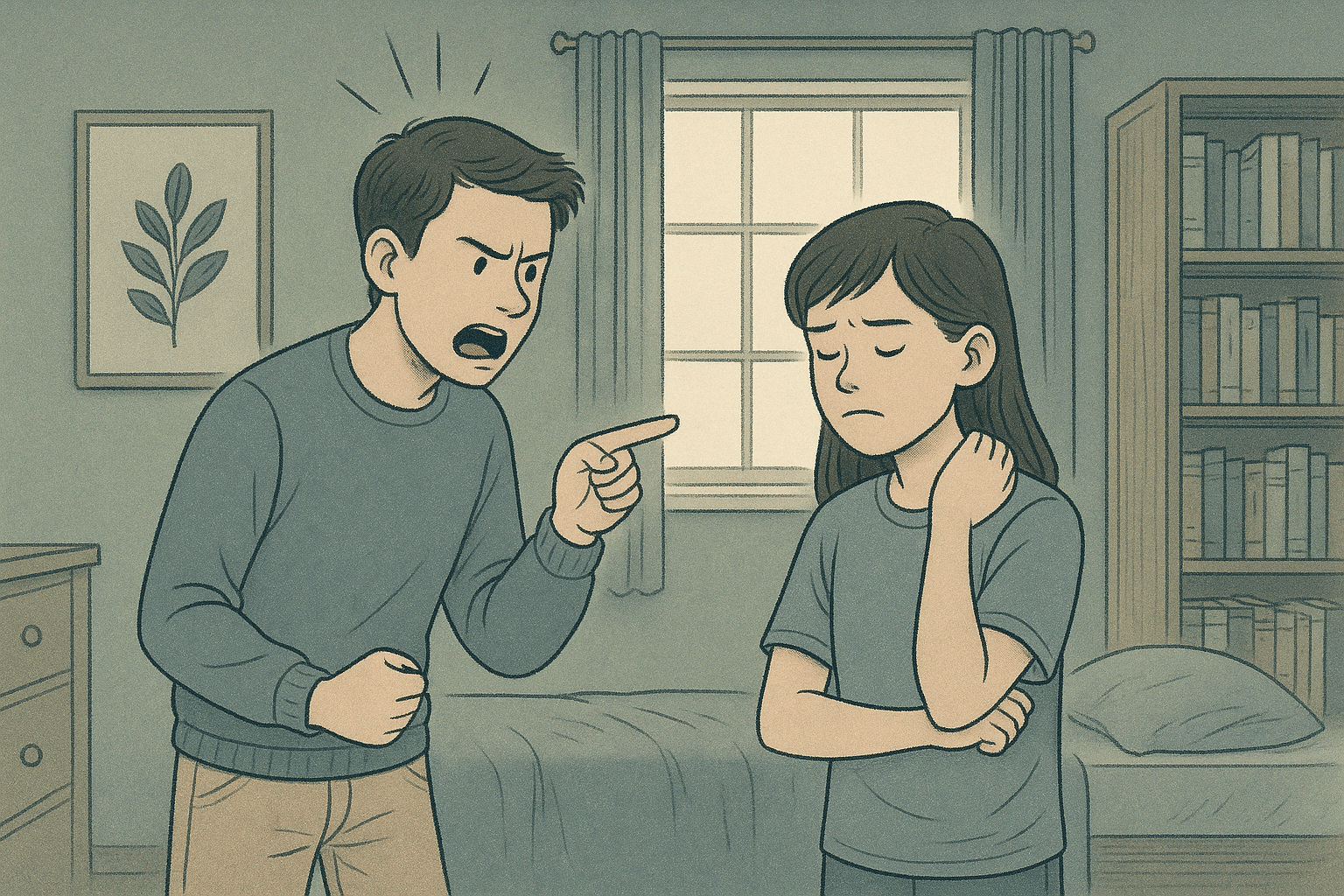
One scenario could be snapping at a sibling for borrowing something without asking.
While this might seem like typical teenage behavior, if it’s happening frequently, it might be a sign of underlying anxiety.
Behavioral Symptoms
Avoidance Behaviour
If you’re feeling anxious, you might start avoiding situations or activities that trigger anxiety, such as social gatherings, school events, or even family functions. This avoidance can lead to missed opportunities and a lack of engagement in activities they once enjoyed.
For example, a teen boy might suddenly stop attending soccer practice and say that he doesn’t enjoy it anymore. However, the underlying reason could be anxiety about performance or social interactions. Identifying avoidance behaviors early can help address the root cause and encourage re-engagement.
Restlessness
Teenage boys with anxiety might find it difficult to sit still or concentrate on tasks for extended periods. This restlessness can interfere with your ability to complete homework or focus during classes.
For example, you might constantly fidget during class or struggle to sit through a family dinner. While it might seem like typical teenage energy, it could be a sign of anxiety.
Impact on Daily Life
Academic Performance
Anxiety can take a toll on academic performance. You might struggle with concentration, leading to incomplete assignments or poor test results. The pressure to perform academically can further heighten anxiety, creating a vicious cycle.
Recognize when anxiety is affecting your schoolwork and seek help. Your teachers and parents can work together to provide support, whether through tutoring, counseling, or accommodations that help you manage stress and improve academic outcomes.
Social Interactions
Social interactions can become challenging for teen boys with anxiety. You may withdraw from friends or avoid social situations, fearing judgment or embarrassment. This withdrawal can lead to loneliness and a lack of support from peers.
Engaging in activities that align with your interests can provide opportunities to build confidence and develop social skills without the pressure of large group settings.
Relationship with Family
Anxiety can strain family relationships as you become more withdrawn or irritable, leading to misunderstandings or conflicts at home. Family members might struggle to understand these changes, further complicating the situation.
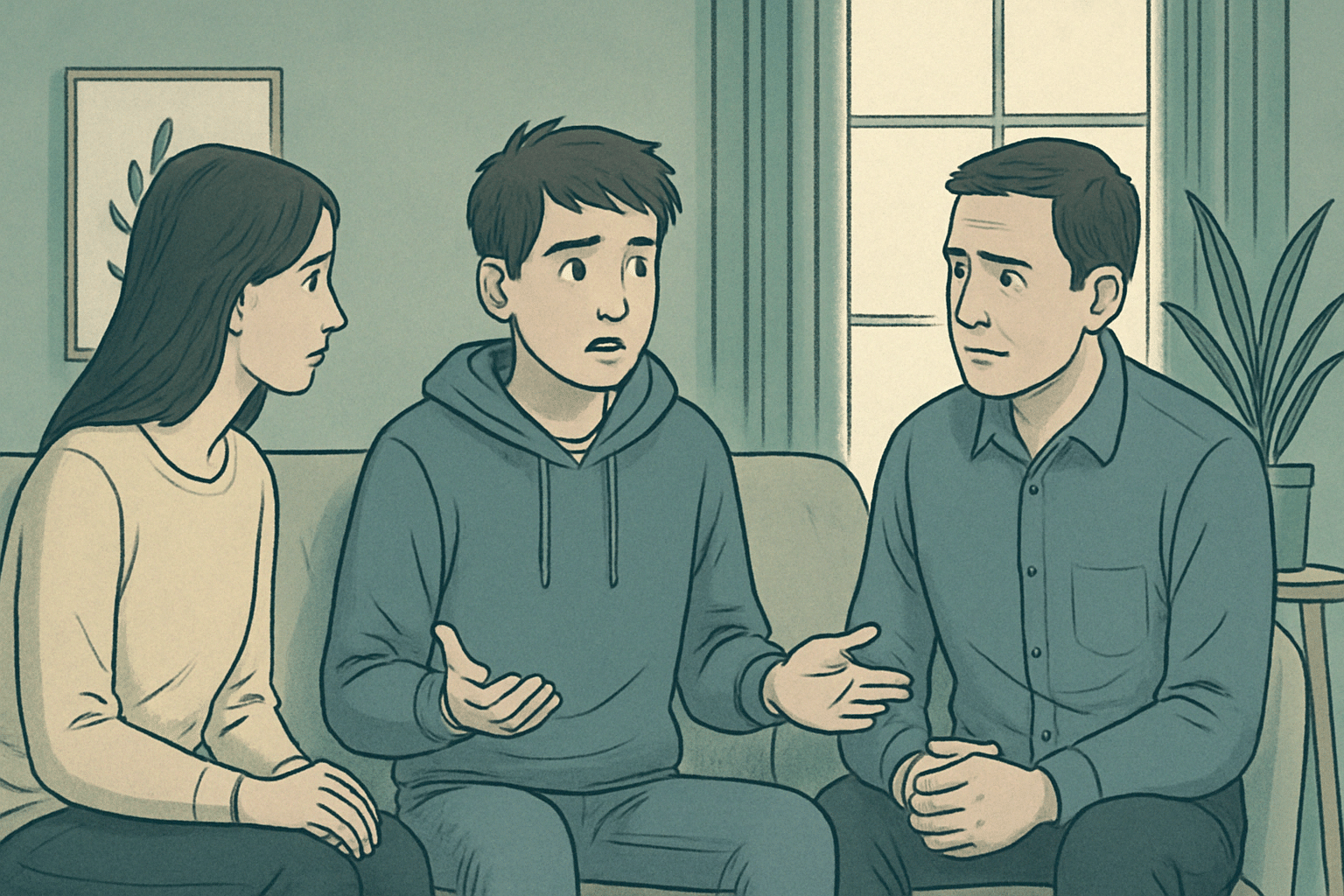
Open communication is key to maintaining strong family relationships.
Having honest conversations about your anxiety and its effects can foster understanding and empathy, allowing family members to support you more effectively.
Coping Strategies
Seeking Professional Help
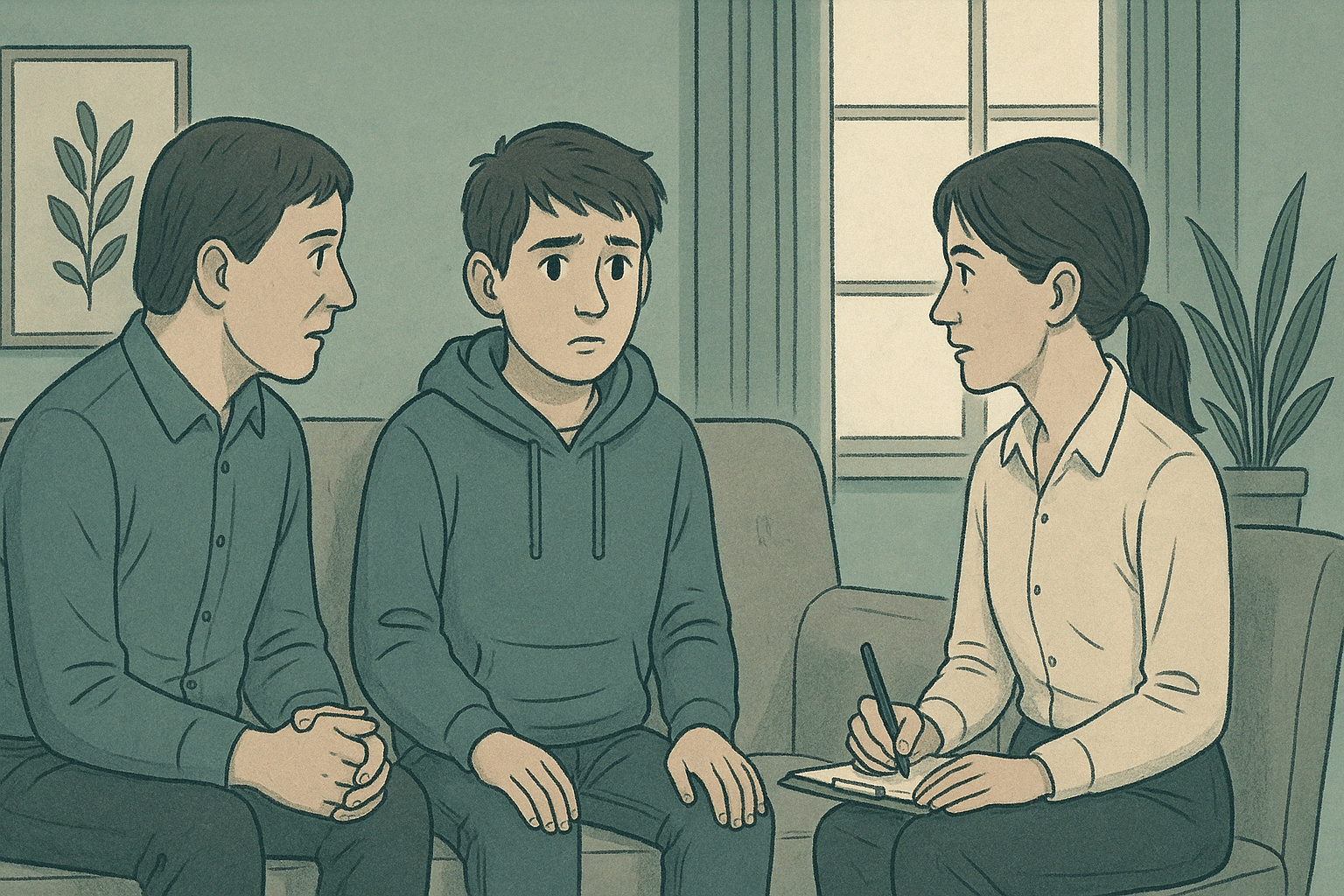
Professional help is a crucial component of managing anxiety.
Therapists and counselors can provide evidence-based treatments, such as Cognitive Behavioral Therapy (CBT), to help teens understand and manage their anxiety.
By addressing anxiety through professional support and coping strategies, you can learn to manage your symptoms effectively, leading to improved mental health and overall well-being.
Building a Support System
Build a robust support system that includes family, friends, teachers, and mental health professionals who can provide guidance and encouragement. A strong support network can make a significant difference in managing anxiety effectively.
Encouragement for Support
You should know that it’s okay to seek help and talk about your feelings—it can even empower you to take control of your mental health. With the right support and resources, you can learn to manage your anxiety and lead fulfilling lives.
Remember, anxiety is a common experience, and reaching out for support is a brave and commendable step.
Mission Prep: Breaking the Cycle of Teen Boy Anxiety
Mission Prep understands that behind the headaches, irritability, and social withdrawal lies a young man struggling to manage overwhelming emotions without the proper tools. Through evidence-based therapies including CBT, DBT, and somatic experiencing, we equip you with practical strategies specifically customized to the challenges young teens face.
Unlike general approaches, our biopsychosocial model examines how biological factors, thought patterns, and environmental influences converge to create personalized treatment plans. What truly sets our approach apart is our commitment to sustainable recovery.

Our supportive environment provides you with a space to connect with peers and with our specialists.
Within our structured, supportive environment in California and Virginia, you can connect with peers facing similar challenges while working with specialists who understand adolescent development.
You deserve more than temporary relief—you deserve the confidence to face life’s challenges head-on. Contact our admissions team today to learn how Mission Prep can transform anxiety into empowerment.
Frequently Asked Questions
What causes anxiety in teen boys?
Anxiety in teen boys can be caused by several factors, including genetic predispositions, environmental stressors, and hormonal changes. Academic pressures, social relationships, and family conflicts can also contribute to anxiety disorders.
How can parents help their anxious teens?
Parents can help their anxious teens by providing a supportive and understanding environment. Encouraging open communication and actively listening to their concerns can make a significant difference. It’s also important to seek professional help when needed and to educate oneself about anxiety and its symptoms.
What are effective treatments for anxiety?
Effective treatments for anxiety include Cognitive Behavioral Therapy (CBT), medication, and lifestyle changes. CBT helps teens understand and change their thought patterns, while medication can be prescribed to manage severe symptoms. Lifestyle changes, such as regular exercise and mindfulness practices, can also support overall mental health.
Can lifestyle changes reduce anxiety symptoms?
Yes, lifestyle changes can significantly reduce anxiety symptoms. Incorporating regular physical activity, maintaining a balanced diet, and ensuring adequate sleep can improve mental health. Mindfulness practices, such as meditation and deep breathing exercises, can also help in managing anxiety effectively.
How does anxiety affect a teen boy’s academic performance?
Anxiety can significantly impact a teen boy’s ability to concentrate, complete assignments, and perform well on tests. Constant worrying consumes mental energy that would otherwise be available for learning and problem-solving. This often creates a cycle where academic struggles increase anxiety, which further impairs performance. At Mission Prep, we address this cycle through structured academic support alongside anxiety treatment.


